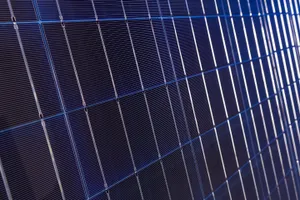
Photovoltaics
The Photovoltaics (PV) department analyzes and develops photovoltaic materials, solar cells and photovoltaic modules with the aim of making photovoltaics even more sustainable, reliable and cost-effective, adapting them to special applications and thus making them even more widely used. The department works on all stages of the value chain from absorber material to cell development and PV module development. Topics include fundamental questions of materials research as well as the analysis of individual solar cells using simulation and self-developed measurement methods and the optimization of cells and modules in the laboratory. Our applied research aims to develop solutions that can be implemented in industry in the short to medium term.
A particular focus is on the further development of modern technologies such as silicon photovoltaics, research into tandem solar cells and innovative perovskite solar cells. Photovoltaic systems are also considered holistically - from the individual cell to integration into energy-efficient overall solutions.
Building-integrated photovoltaics (BIPV) is also an important topic of our research. Here we combine architectural design with energy-efficient energy generation to create aesthetically pleasing and functionally efficient solutions for the energy transition in the building sector.
Current research topics
- Loss and sensitivity analyses of solar cells based on simulations and precise measurement data
- Key technologies for the cost-efficient production of high-efficiency solar cells, e.g. through the use of polycrystalline silicon contacts
- Development of solar cells based on metal halide perovskites
- Development of tandem solar cells
- Improving the stability of perovskite solar cells
- Evaluation of various industrial manufacturing processes for perovskite solar cells
- Surface passivation of silicon solar cells using materials such as SiO₂, SiNx, Al₂O₃ and polycrystalline silicon
- Development of highly efficient cells with POLO contacts (poly-Si on oxide)
- Industry-related technology and process development to improve production processes
- Introduction of new camera-based characterization methods for silicon materials, solar cells and modules
- Analysis of defects in silicon and their influence on the properties of solar cells and PV modules
- Development of new connection technologies for PV modules
- Investigation of the long-term stability of solar cells and PV modules
- Research into the mechanical properties of modules
- Automated production of special PV modules for integration into vehicles (VIPV) or buildings (BIPV)
- Implementation of component and process simulations to optimize solar cell technology
Research groups in the Photovoltaics department
Photovoltaics materials research
Prof. Dr. Jan Schmidt
Solar cell characterization
Dr. Karsten Bothe
Industrial solar cells
Dr. Thorsten Dullweber
Next generation solar cells
Prof. Dr. Robby Peibst
Photovoltaics fabrication
Dr. Verena Mertens
Photovoltaics special module production
Dr. Henning Schulte-Huxel
Photovoltaics reliability
Dr. Marc Köntges